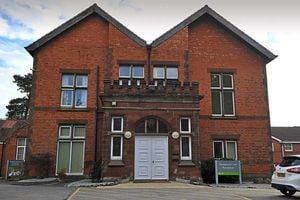Huntercombe Hospital: Stafford children's mental health hospital put in special measures
A whistleblower prompted an inspection at a children's mental health hospital, which has since been rated inadequate and put in special measures by watchdogs.

Inspectors from the Care Quality Commission found staff at Huntercombe Hospital Stafford, which is based along the A5 in Wheaton Aston near Ivetsey Bank, used physical restraint 'as a first rather than a last response'.
A whistleblower sparked the inspection at the hospital, which provides mental health inpatient services for up to 39 young people aged eight to 18, and was found to be failing in every aspect including its safety, effectiveness, responsiveness, leadership and level of care.
Among the host of criticisms, the CQC's deputy chief inspector of hospitals, Dr Paul Lelliott, said: "Staff often used physical restraint as a first, rather than last, response to a patient's distress."
Click here to read the full report
During inspections in April and May, a staff member did not intervene when a child repeatedly banged their head against a wall, inspectors said.
Another young person self-harmed so badly using a 'contraband' item that they required emergency hospital treatment, the CQC report revealed.
Inspectors also found the safety of young people was compromised due to insufficient staffing levels, restrictive interventions, poor physical health monitoring and a poorly trained and supervised workforce.
Personal searches were found to be ineffective in preventing young people from obtaining contraband items to use to harm themselves.
The report found that staff did not store medication securely in all areas, situations that could lead to aggressive or disturbed behaviour were not being routinely de-escalated and feedback from young people and their carers was largely negative and reflected a hospital that did not take into account the individual needs of those using the service.
Inspectors also revealed that young people were not involved in care planning and care plans were not shared with them and some staff showed punitive behaviour.
With the service in special measures, they now have six months to improve or the CQC say they will take steps to prevent the provider from operating the service.
Explaining the process Sir Mike Richards, the Chief Inspector of Hospitals, said: "I am placing the service into special measures. Services placed in special measures will be inspected again within six months.
"If insufficient improvements have been made such that there remains a rating of inadequate overall or for any key question or core service, we will take action in line with our enforcement procedures to begin the process of preventing the provider from operating the service. This will lead to cancelling their registration or to varying the terms of their registration within six months if they do not improve.
"The service will be kept under review and, if needed, could be escalated to urgent enforcement action.
"Where necessary another inspection will be conducted within a further six months, and if there is not enough improvement we will move to close the service by adopting our proposal to vary the provider's registration to remove this location or cancel the provider's registration."
Huntercombe is divided into three separate wards – Hartley, Thorneycroft and Wedgewood. A dedicated consultant child and adolescent psychiatrist leads each ward team.
Hartley is a psychiatric intensive care unit providing 12 beds for male and female young people, Thorneycroft is a general acute assessment unit with 12 beds for young people aged 12-18 years and Wedgewood has 15 beds and provides a specialist eating disorders service.
Commenting on the damning report, a spokesman for the hospital said: "We have been carrying out an improvement programme at The Huntercombe Hospital Stafford over the past few months to address the requirements of the Care Quality Commission inspection report from their visit in May.
"For a short period of time we stopped taking new admissions but, as a result of rapid improvements that were made, it was agreed that the hospital should accept new admissions, on a phased basis five weeks later.
"A further CQC inspection took place in June and although we are awaiting the written report, the inspectors' verbal feedback acknowledged that improvements had been made and that the hospital had addressed the concerns raised in the warning notice.
"We deeply regret that some aspects of the service had fallen below the high standards that we are committed to provide. We are confident that the centre has been turned around by the strengthened management team and it has made good progress towards returning to the standards that we expect of it."





